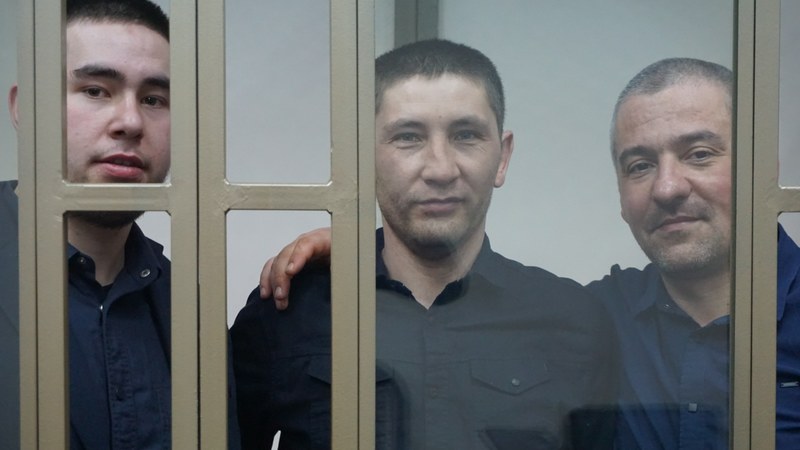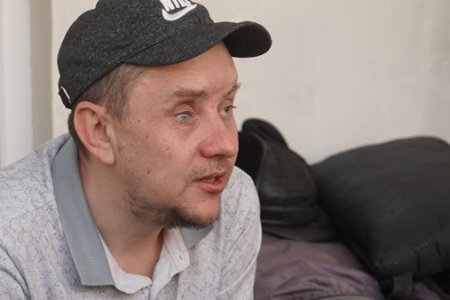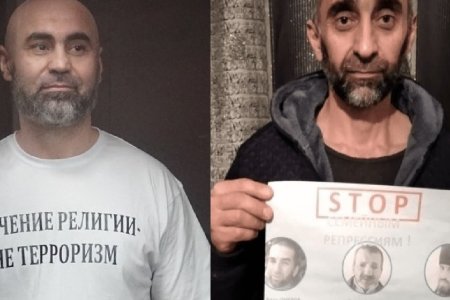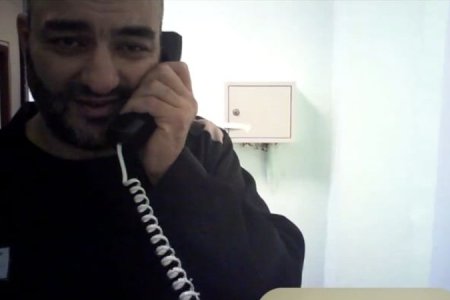
In a potentially important first, a ‘court’ in occupied Crimea has agreed that the refusal by Russia’s penal service to imprison Arsen Abkhairov closer to his family and home is unlawful. The recognized Crimean Tatar political prisoner is currently held seven thousand kilometres from Crimea, making it all but impossible for his family to visit him.
The ruling by the occupation ‘Krasnohvardiiske district court’ was reported on 20 September by lawyer Nazim Sheikhmambet. He explained that Abkhairov is currently serving a 13-year sentence in prison colony No. 8 in Buryatia in the Russian Federation. The distance of seven thousand kilometres deprives Abkhairov and his relatives of any possibility of maintaining family ties. They cannot earn enough to save for the prohibitively expensive journey. During the hearing, the ‘judge’ demanded information about prison colonies in occupied Crimea or oblasts nearest to it. This was duly provided by the defence, who could demonstrate that there were places available both in occupied Crimea, and in Rostov oblast in Russia, and two other oblasts near the latter. Abkhairov’s wife has repeatedly applied to the Russian penal service for her husband to be transferred closer to his family, and received refusal after refusal, hence the application to the ‘court’ that the refusals were unlawrful.
The right to a family life is enshrined in numerous international documents, and was the reason why Russia was found in violation of this right by the European Court of Human Rights back in 2017.
This has not stopped Russia from imprisoning Crimean Tatar and other Ukrainian political prisoners thousand of kilometres from their home, with refusals by the penal service earlier upheld by Russian courts. It is cheering that one ‘judge’, albeit of an illegal cccupation ‘court’, acknowledged the illegality, however there remains no guarantee that the ruling will lead to Abkhairov being moved from Bashkiria.

Arsen Abkhairov (b. 1985); Rustem Emiruseinov (b. 1979); and Eskender Abdulganiev (b. 1997) have all been in Russian captivity since 14 February 2019, when they became victims of Russia’s most notorious conveyor belt prosecutions in occupied Crimea. Eskender was just 21 at the time of his arrest. It is likely that all three men were targeted because of their civic activism. Both Emiruseinov and Abkhairov had actively helped political prisoners and their families, Emiruseinov as part of the Crimean Solidarity human rights movement. Despite his youth, Abdulganiev had attended politically motivated hearings. After the armed ‘searches’ on 14 February 1919 of the men’s homes in Oktiabrske (Krasnohvardiisk district) Aliye Emiruseinova was asked if her husband had been involved in Crimean Solidarity. She replied: “Can you tell me how it is possible in Crimea to not be involved in Crimean Solidarity if you have a conscience?” Her husband had visited political trials, took part in flash-mobs protesting against mounting repression and in other ways helped political prisoners. A week before his arrest, he had travelled to Rostov (Russia) for the latest court hearing against five Crimean Tatar political prisoners and was planning to go there again.
The armed men who burst into the men’s homes never pretended to be looking for anything but ‘prohibited religious literature’. In the Emiruseinov home, they decided not to waste any time, but claimed to have ‘found’ the books they had brought with them and planted in a place where no devout Muslim would have keep such material.
Russia once again used serious ‘terrorism’ charges although the three men were accused only of entirely unproven ‘involvement’ in Hizb ut-Tahrir, a peaceful transnational Muslim movement which is legal in Ukraine, and which is not known to have committed any acts of terrorism or violence anywhere in the world. The prosecutions are based solely on a highly secretive and probably politically motivated ruling by the Supreme Court in 2003 declaring Hizb ut-Tahrir ‘terrorist’.
Emiruseinov was charged with the more serious ‘organizing’ a fictitious Hizb ut-Tahrir group (under Article 205.5 § 1 of Russia’s criminal code), while the others were accused of ‘involvement’ in the supposed group. It had long become standard in occupied Crimea for the FSB to add the overtly surreal charge (under Article 278) of ‘planning to violently seize power’.
There was no evidence to back the charges. As well as planted ‘prohibited literature’, the men were charged on the basis of illicitly made tapes of three meetings where the men read a book and discussed the upbringing of children, relations between men and women; and priorities in life. Assessments of these conversations were provided by FSB -loyal ‘experts’ who invariably find ‘evidence’ of Hizb ut-Tahrir affiliation in the use of this or that word or choice of topic for discussion.
Russia’s political trials primarily hinge on anonymous witnesses whose ‘testimony’ cannot be verified and who may not even know the defendants. The judges invariably allow such secret testimony and actively obstruct efforts by the defence to show that the ‘witnesses’ are lying.
The ‘trial’ began in January 2020 at the notorious Southern District Military Court in Rostov-on-Don, with all of the above and other flaws demonstrated at each of the 21 hearings. Despite this, prosecutors Valery Kuznetsov and Igor Nadolinsky claimed that the men’s ‘guilt’ had been proven and demanded huge sentences. On 3 November 2020, presiding judge Ruslan Plisko, together with Igor Kostin and Yevgeny Zviagin obliged, sentencing Rustem Emiruseinov to 17 years harsh regime imprisonment; Arsen Abkhairov to 13 years and Eskender Abdulganiev – to 12 years. In each case, the first two years was to be in a prison, the worst of Russian penal institutions.
The sentences were upheld on 1 November 2021, with the Military Court of Appeal in Vlasikha ignoring all of the flaws in the charges, the lack of evidence and the fact that the men are recognized political prisoners whose release has been demanded far beyond Ukraine and Russia.



